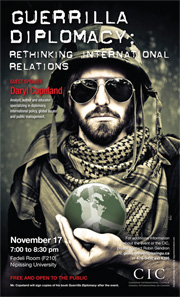N.B.: The post below was prepared as a guest editorial for e-International Relations. Some of the front end argumentation may be familiar to regular GD readers, but the topic is of sufficient currency that I have presented the piece in its entirety.
In my book Guerrilla Diplomacy, I argue that if development is the new security in the age of globalization, then diplomacy must displace defence at the centre of international policy.
More recently, in a short article on science diplomacy, I observe that when it comes to assessing the role of science and technology (S&T) in international relations, one is confronted by a significant paradox.
Unlike religious extremism or political violence, most of the threats and challenges which imperil life on the planet – climate change, resource scarcity, public health – are rooted in science and driven by technology. While S&T can provide the remedies which contribute materially to the achievement of security and development, for instance through remote sensing, agronomy, or the introduction of game changing information and communication technologies, it can also give rise to the opposite – insecurity and underdevelopment. Here I refer to the scourge of weapons of mass destruction, the mismanagement of toxic wastes, the repression of human rights and civil liberties, and so forth.
In other words, in addition to its key function as a driver of globalization, when it comes to understanding the dynamics of contemporary international relations, S&T plays the part of a powerful, two-edged sword. It can provide solutions to some of the world’s most vexing problems, even as it creates new ones.
Nowhere has this observation been brought into sharper relief than in the case of the most recent, and on this occasion phased release by WikiLeaks of what will amount eventually to hundreds of thousands of classified diplomatic reports. The very technologies which facilitate modern diplomatic communications have also made possible their unauthorized reproduction and mass dissemination.

